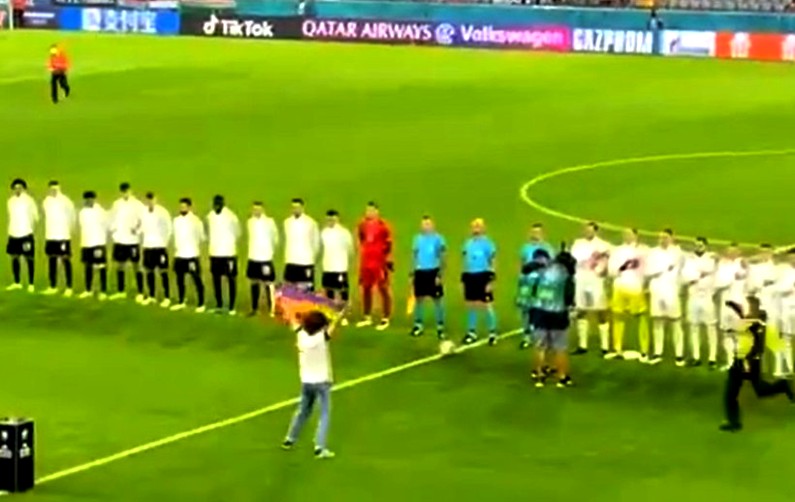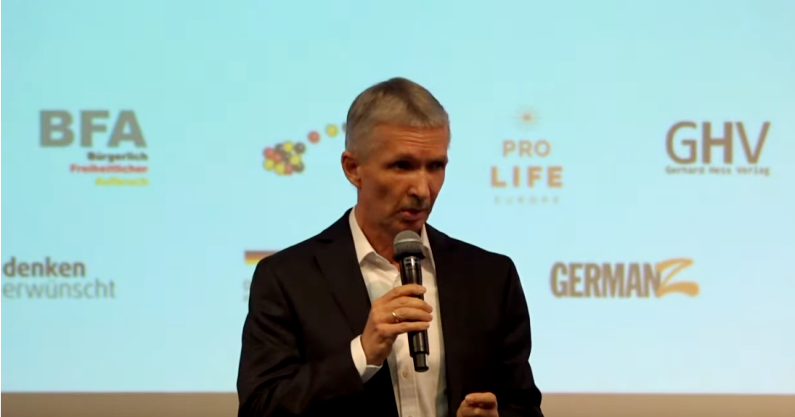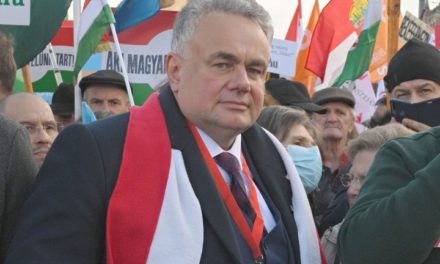In North Rhine-Westphalia, the former leader of the parliamentary faction of the FDP, the president of the German-Hungarian Society, took part in the EUCET congress for the first time. Gerhard Papke's presentation is presented below.
"Ladies and gentlemen! We can still use this form of address in Germany. There is hardly any other country in Europe to which we Germans owe as much as Hungary. At the same time, there is hardly any other country in Europe that Germany treats so unfairly.
Ladies and gentlemen, when our good friends are treated badly, it cannot just be accepted, but we must speak out against it! I would like to give you some thoughts on this in the short time available. I would like to go over three questions. First of all, what do we owe to Hungary? Second, how are Hungary and Hungarian politics treated in Germany? And thirdly, why is this so? What is the reason of this?
We are (now) celebrating the day of German unity, which in the memory of all of us is primarily related to November 9, 1989, the fall of the Berlin Wall. And I am sure that we are all happy to celebrate this day, the day of the reunification of our country. But - and I want to do this today! - we should not only remember November 9, 1989, but also, for example, August 19, 1989, when the so-called Pan-European Picnic took place in Sopron, located on the Hungarian-Austrian border, not far from Vienna. It sounds like a few people met on a nice summer afternoon somewhere in the countryside for coffee and cake. Did a historical event really take place that day?
Yes, it was, because on August 19, 1989, Hungary opened its western border, initially only temporarily, so that 700 GDR citizens, 700 of our compatriots could find their way to freedom. We really shouldn't forget this, because the communists were still in power in Hungary at the time. And if these 700 young GDR citizens had tried to escape across the inner German border in Berlin on the same day, many of them would not have survived. The Hungarians took the risk that members of another nation would find their way to freedom.
That's how Hungarians are, ladies and gentlemen!
And thirdly, I would like to draw your attention to another historical date, which goes back a little further. October 23 is a public holiday in Hungary, and Hungarians commemorate October 23, 1956 every year. The Hungarian national uprising against communist oppression broke out on this day. It really broke out. On this day, hundreds of thousands marched on the streets of Budapest to demonstrate and fight for the freedom of their country. And although this revolution was crushed by Russian tanks after two weeks, the uprising was not in vain The Hungarian uprising is also a milestone in the history of European freedom. Because it was, in the consciousness of all of Europe. He kept alive the conviction that the communist oppression of Europe and the division of Europe could not last forever.
Ladies and gentlemen, we can thank the Hungarians for this too!
During the more than 1,000 years of their existence as a state, the Hungarians had to constantly fight for mere survival. They experienced phases of brutal occupation. 150 years under Turkish rule! And they never let themselves be defeated. Believe me, ladies and gentlemen, the love of freedom is firmly fixed in the DNA of the Hungarian people. Hungarians do not need Western Europe to teach them arrogant lessons about the functioning of liberal democracy. And anyway, they don't need such lessons from Germany either. Not really from Germany.

Hungarian footballers were provoked with a rainbow flag (Source: Twitter)
Let's move on to the second point. This year we experienced the sad, so far saddest climax of the campaign against Hungarian politics in Germany and other countries of Western Europe. But let's stick to what we experienced in Germany! They all remembered the European football championship, the match of the German national team against Hungary in Munich. When the vast majority of German parties and the German media thought it was the right time to give a worldwide visible sign of their protest against the "evil homophobic" policy of the Hungarians and light up the Allianz Arena in Munich in rainbow colors. They could follow the news on every channel - as if it were natural - that homophobic politics, i.e. homophobia against gays, prevails in Hungary. It goes without saying that they were propagated as some kind of natural law, since the Hungarian Parliament created a law about it. Although the purpose of the law was and still is to limit the early sexualization of children during school hours.
Ladies and gentlemen, that was the point! Just a side note, I have a feeling that if German parents were to learn about the curriculum used in German schools on this topic, many of them would support a similar law in Germany.
In any case, one thing is clear. This law did not affect the rights of adult homosexuals in Hungary at all. No one in Germany wanted to acknowledge that the legal institution of registered partnership has existed in Hungary for years, which is largely identical to the German regulations. And that homosexuals can live protected, well and safely in Hungary. Yes, that's the reality. This was completely ignored in Germany. And this was hurtful, very slanderous towards our Hungarian friends.
Ladies and gentlemen, this is not appropriate! And the biggest shamelessness was that someone abused the role of the host in this way. As a host, if you treat your guests like this, don't be surprised if you lose friends soon. By the way, when the Hungarian team comes to Germany, everyone feels strong. Then everyone has a big face. The World Cup will be held in Qatar at the end of next year. Oh yes, homosexuality is punishable by prison there. Do you think the DFB will be handing out rainbow flags outside stadiums in Qatar? Is that what you mean? Do you think Markus Söder will be sitting in the stands then? Or others with the rainbow mask on their face? This is Pharisaism, ladies and gentlemen, which unfortunately has become the norm in Germany. I think this is fatal.
Let's move on to a second point. This is also an accusation that is constantly being spread, the alleged eradication of press freedom and media diversity. with MP Barley a few weeks ago No, I enjoyed it. I enjoyed the discussion. I said to her, “Yes, Mrs. Barley, let's work this out, let's go through it. Let's rely on the facts. RTL has the largest reach in Hungary. The largest Hungarian daily newspaper, Népszava, is a traditional social democrat and critical of the government, while the largest weekly newspaper, HVG, criticizes the Hungarian government so brutally that hardly any newspaper in Germany would dare to do so. Let's look at the Internet. Among the eight online portals with the largest reach. which broadcast in Hungarian in Hungary, seven are clearly on the side of the opposition. These are the facts. That is why I always find it remarkable to be diplomatic when ARD and ZDF always mention the alleged lack of media diversity in Hungary. That means something.
Anyway, what is interesting is not only what is reported, but also what is not reported. When the Hungarians voted out the last left-wing government in 2010, they literally kicked it out, Hungary was completely cut off economically and socially. We always remember the crisis in Greece in 2010. The Hungarian one had a similar dimension. The country was really exhausted. Then a new government implemented a market economy reform program. With such consistency and radicalism that we cannot even imagine. For example, with a flat tax of 15 percent of income.
Only very bold experts talk about this. The others don't even dare to do it. By eliminating almost all tax exemptions, this would be a truly radical tax reform. Hungary has the lowest corporate tax rate of nine percent in the entire European Union, and this free market reform policy has unleashed enormous growth dynamics. Without knowing this, the enormous enthusiasm of the Hungarian people for their government cannot be understood. But the reports in Germany completely ignore this too. In concrete terms: in 2010, there were 1.8 million taxpayers in Hungary out of a population of around 10 million. Ten years later, in 2020, this number rose to 4.5 million. The income tax was drastically reduced during these ten years, the number of employees increased to 1.8-4.5 million, unemployment in Hungary decreased from 12.5 percent to 3.3 percent. According to Eurostat data, the proportion of people living in relative poverty dropped from 27 percent to 8.7 percent during this period. It would certainly be useful if such facts were pointed out from time to time in Germany, ladies and gentlemen. It doesn't happen, and so we ask why not? And to be honest, many Hungarians ask me this question when I'm in Budapest, because you should know that Hungarians love Germany. Anyone who has had the opportunity to spend a little longer in Hungary may have noticed how Hungarians generally treat us Germans with respect and sympathy.

Anti-Semitic migrant protest in Berlin (Source: AFP/Tobias Schwarz)
They never believe me when I tell them what Berlin is like. No, no, really. That is impossible. They couldn't even imagine. Because there are no burning barricades in Hungary. There are no cars set on fire by dissidents. There is absolutely no political violence, it doesn't exist. They don't know that at all. And when you tell them how things are going here, sometimes they think you're reporting from Colombia, but unfortunately, that's Berlin. Why, why do they treat Hungary like this in Germany? I always try to explain to my Hungarian interlocutors and friends that this is not directed against Hungary itself, but rather the cause of this smear campaign and disinformation campaign, in which, unfortunately, German politics and the majority of the media also participate. Because the reason is simple. Most German parties and the German media do not like the whole direction of Hungarian politics, they do not like the whole direction.
In 2015, Germany opened Europe's borders and imposed its migration policy on the entire European Union. The Hungarians consistently opposed it. And since then, there has been this fundamental conflict between the German government and the Hungarians who want to protect Europe. And as we just said, the Hungarians want to protect Europe's cultural identity. The self-image of the Hungarians is a Western Christian self-image. They also oppose mass migration to Europe because they do not want to sacrifice their Christian-Western self-image to mass migration. Ladies and gentlemen! This is the firm belief of the Hungarians. And it stands in recognizable contrast to the cultural arbitrariness of the political left, far beyond Germany.
This is a huge contrast and this is the third point. This explains the campaign against Hungary. This is, of course, a question related to the statics of the European Union. If you look at the institutions of the European Union in Brussels, be it the Parliament, the Commission or the European Court of Justice, they all agree on one thing: they want more power. They want to transfer more and more influence to Brussels, through parties and institutions. This is the point that brings everyone together and is the biggest obstacle to this policy which, if left unchecked, would ultimately lead to a European superstate. this policy is Hungary.
Ladies and gentlemen! Because the Hungarians are pro-European, enthusiastically pro-European. But they don't want Brussels centralism, they want a Europe of nations, a free Europe. And they do it well. That is why they should be supported in this. And I am really observing, I have already experienced many things in politics, but I am partly horrified to see how the campaign against Hungary is being intensified in Brussels. They still remember the words of the Dutch prime minister, Mark Rutte , a few weeks ago, when he told the television cameras after the European Council meeting in Brussels: "We want to bring Hungary to its knees. We want to force Hungary to its knees." An unimaginable aberration in the way we treat each other. If this is the new tone, ladies and gentlemen, how do we want to keep Europe together?
How do we even want to intervene in the conflicts with China, Russia, but also with our American friends? Not to mention the Islamist threat. We have just experienced the disaster in Afghanistan. We will only be able to defend our perception of European freedom together, if we can defend it at all. For this, we Europeans must come together. And I can tell you that we can be happy that we have friends like Hungary standing by us in the fight against Islamism. Finally something comforting. The Hungarians will not be forced to their knees so easily. If the pressure from outside increases, the Hungarians will unite even more closely, as they have always done throughout their long history. But. I think it's important. Our Hungarian friends also see this. That they are not alone in this debate. That there are many citizens, many people in Germany who share the convictions of the Hungarians and do everything to defend them against these baseless accusations, ladies and gentlemen. And last but not least, this is my request to all of you. In whatever form, carry the goals of the Hungarians, I will spread the convictions of the Hungarians. Not only in their hearts, but also in their conversations, in the positions where they are active. Ladies and gentlemen, Europe and Germany have always benefited from the Hungarians' love of freedom. And this Hungarian love of freedom is so valuable that we must help protect it."
Gerhard Papke's speech in German on the ungarnreal.de website or watch it in the video below.
(Cover image source: YouTube)













